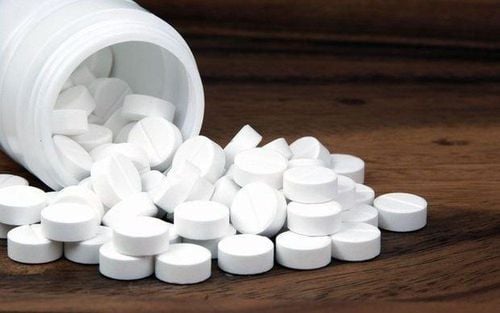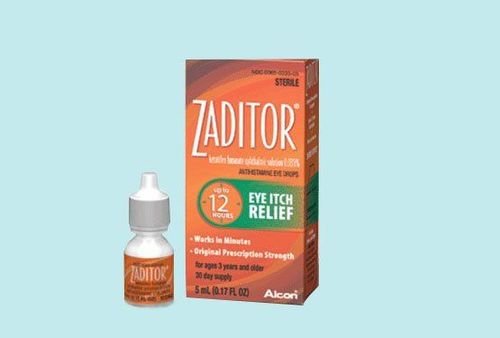This is an automatically translated article.
Mannitol 20 is an osmotic diuretic, used to prevent acute renal failure or to treat endoscopic hypertension or glaucoma. So what is Mannitol 20 and how is it used?
1. What is mannitol?
Mannitol 20% is prepared in the form of an infusion solution in 250ml and 500ml strengths. Mannitol 20% is a product of Mekophar Chemical - Pharmaceutical Joint Stock Company.
Mannitol is an osmotic diuretic, with little caloric value because it is rapidly eliminated from the body intact along with a corresponding amount of urine before being metabolized. The half-life of Mannitol 20 is about 100 minutes (in subjects with normal renal function). In patients with renal failure, Mannitol 20 accumulates in the body, causing water to move into the vascular lumen and consequent loss of intracellular water and hyponatremia.
Mannitol is an isomer of Sorbitol. After being administered intravenously, Mannitol 20 is rapidly distributed into the intercellular space. Therefore, the effect of the drug increases the osmolality of plasma and tubular fluid, causing osmotic diuresis and increasing renal blood flow. The effect of Mannitol 20 is stronger than that of Dextrose (because it is less metabolized and reabsorbed in the renal tubules). Mannitol 20 is used with the main purpose of causing osmotic diuresis to protect renal function in acute renal failure, reducing intracranial pressure and intraocular pressure. In addition, Mannitol 20 is also used to induce forced diuresis in patients with drug overdose.
Manitol 20 should not be used in patients with heart failure, because of a sudden increase in blood volume. High doses of Mannitol 20 in the treatment of cerebral edema can alter the volume, osmolality, and composition of extracellular fluid to such an extent that it may lead to acute renal failure, decompensated heart failure, and other complications.
Mannitol 20 intravenous infusion is also used in cardiovascular surgery, many other types of surgery or after trauma.
2. Indications of Mannitol 20
Manitol 20 is indicated in the following cases:
Prophylaxis of acute renal necrosis due to hypotension; Mannitol 20 treatment of oliguria after surgery; Mannitol 20 supports the treatment of poisoning due to its obligatory diuresis to increase the excretion of toxins through the urine; Mannitol 20 reduces intracranial pressure in the treatment of cerebral edema; Mannitol 20 helps reduce intraocular pressure; Use before and during eye surgery; Manitol 20 is also indicated in the study of renal function or washing fluid in laparoscopic prostatectomy.
3. Dosage of Mannitol
Dosage in renal function test: IV infusion of 200 mg/kg body weight or 12.5 g of 15% or 25% Mannitol solution, over a period of 3 to 5 minutes. This dose will stimulate the excretion of 30-50ml of urine every hour for 2 to 3 hours after the Mannitol infusion. If the initial response is not effective, a second test with the same dose can be repeated. If the urine output after the Manitol test is less than 30 - 50 ml/hour, then there is organic kidney damage (and no treatment with mannitol is indicated in this case).
Prophylaxis of acute kidney injury: Intravenous infusion of 50 to 100g Mannitol 5 to 25%. The Manitol 20 infusion rate is adjusted to achieve a urine flow of at least 30 to 50 mL/hour.
Mannitol dose to support increased excretion of toxins: Similar to the case of acute renal failure prophylaxis but maintain urine flow at least 100ml/hour, normally 500ml/hour and maintain positive water balance up up to 1-2 liters.
Mannitol dose to reduce nephrotoxicity of Cisplatin: Rapid infusion of 12.5g Mannitol immediately before administration of Cisplatin, then maintain infusion of Mannitol 20% 10g/hour for 6 hours and maintain urine flow above 100ml/hour . Simultaneously, it must be rehydrated with 0.45% sodium chloride solution, 20 - 30 mEq/liter potassium chloride solution at the rate of 250ml/hour for 6 hours.
Mannitol dose in reducing intracranial pressure: Rapid intravenous infusion of Mannitol 15 to 25% solution at a dose of 1 to 2g/kg over 30-60 minutes. Intact blood-brain barrier causes the infusion of Mannitol to lead to increased intracranial pressure.
Mannitol dose in reducing intraocular pressure: Infuse 1.5-2g/kg over a period of 30-60 minutes with 15-20% Mannitol solution. The intraocular pressure lowering effect appears within 15 minutes of the initiation of the Mannitol infusion and persists for 3 to 8 hours after the end of the infusion.
Mannitol dose used in transurethral prostatectomy: Use 2.5% to 5% Mannitol to irrigate or wash the bladder during surgery.
Dosage of Mannitol 20 for pediatric use:
Treatment of oliguria or anuria: perform the test at a dose of 200 mg/kg as an adult, if there is no kidney damage, use a dose of 2 g/kg intravenously with Mannitol solution 15-20% for 2-6 hours; Mannitol dose in reducing intracranial pressure or ocular pressure: Use Mannitol 2g/kg, intravenous infusion in 30-60 minutes with a solution of 15-25%; Treatment of poisoning: Dose of 2g/kg with 5-10% intravenous solution to maintain large urine flow; Dosage of Mannitol 20 in the elderly: It is recommended to start with the lowest dose and adjust according to individual patient response.
4. Contraindications to the drug Mannitol 20
Manitol 20 is contraindicated in the following cases:
Dehydration; Congestive heart failure; Severe heart disease; Intracranial bleeding after traumatic brain injury (except during craniotomy); Edema due to metabolic disorders with broken capillaries; Severe renal failure (except in cases of response to the diuretic test, if there is no response or a poor response, an increase in extracellular fluid volume may lead to acute water intoxication); Oliguria, anuria after testing with mannitol.
5. Drug interactions of Manitol 20
Manitol 20 should not be infused with whole blood; Patients being treated with lithium should monitor their response to the drug when taking Manitol 20 .
6. Mannitol 20 . side effects
During the use of Mannitol 20, patients may experience some of the following side effects:
Common side effects of Mannitol 20: increase in extracellular fluid volume, circulatory overload, thrombophlebitis pulse, chills, fever, headache, nausea, vomiting, thirst, diarrhea, water and electrolyte imbalance, acid-base loss, chest pain, blurred vision; Rare side effects of Mannitol 20: Mannitol 20 out of the vessels can cause edema and skin necrosis, tachycardia, osmotic focal kidney failure, acute renal failure, allergic reactions such as urticaria, shock anaphylaxis, dizziness. Precautions when using Manitol 20:
Before taking Manitol 20, make sure that the patient is not dehydrated; During the infusion of Mannitol 20, it is necessary to closely monitor the fluid and electrolyte balance, plasma osmolality, renal function of the patient and vital signs; If the fluid flow into the body is more than the urine flow, it can cause water intoxication; The prolonged diuretic effect of Mannitol 20 may mask signs of inadequate rehydration or hypovolemia; The Mannitol 20 IV set needs to be fitted with the built-in filter; Mannitol 20 should not be infused with whole blood; Before infusion of Mannitol 20, the compatibility of substances added to the mannitol solution must be checked; Because this is a hypertonic fluid, only Mannitol 20 should be injected intravenously, otherwise it may cause tissue necrosis; Mannitol can increase the concentration of hydrogen gas in the lumen of the large intestine to the point of rupture of the bowel during dialysis; Mannitol 20 can be used by pregnant women.
7. How to store Mannitol 20
Store Manitol 20 at room temperature from 15 - 30 degrees Celsius, avoid freezing. Crystals can form in solutions containing more than 15% mannitol, especially when stored at low temperatures, at which point the bottle of Mannitol 20 can be soaked in warm water to cause the crystals to dissolve again.
Mannitol 20 is an osmotic diuretic, used to prevent acute renal failure or to treat endoscopic hypertension or glaucoma. To ensure the effectiveness of treatment and avoid unwanted side effects, patients need to take the drug exactly as directed by a doctor or pharmacist.
Follow Vinmec International General Hospital website to get more health, nutrition and beauty information to protect the health of yourself and your loved ones in your family.
Please dial HOTLINE for more information or register for an appointment HERE. Download MyVinmec app to make appointments faster and to manage your bookings easily.













